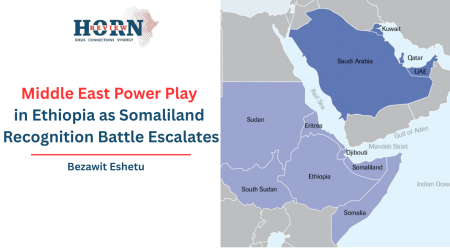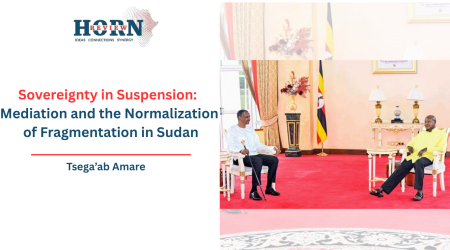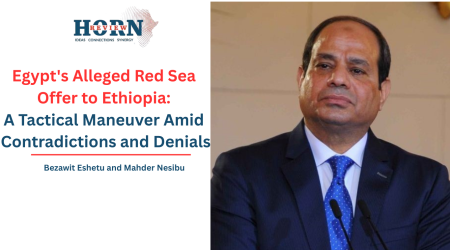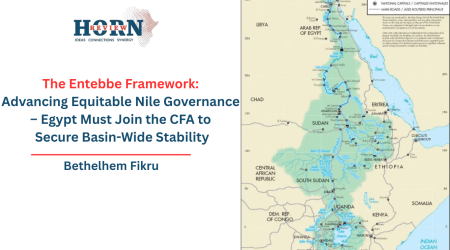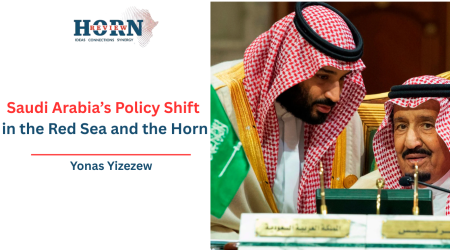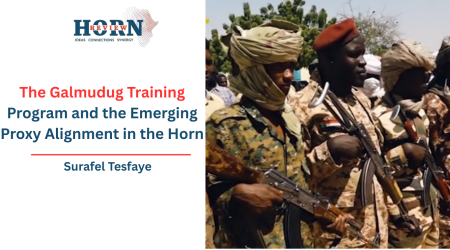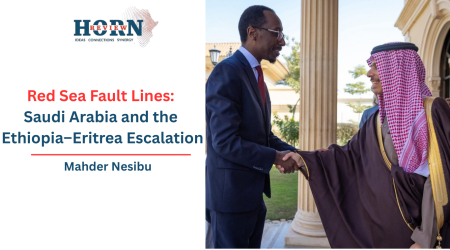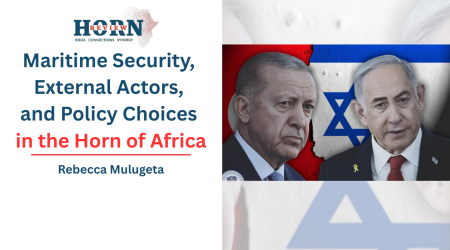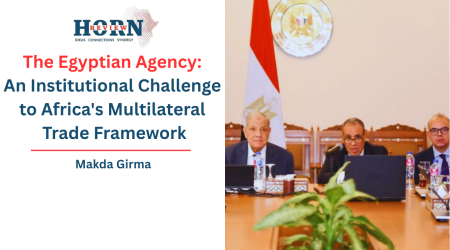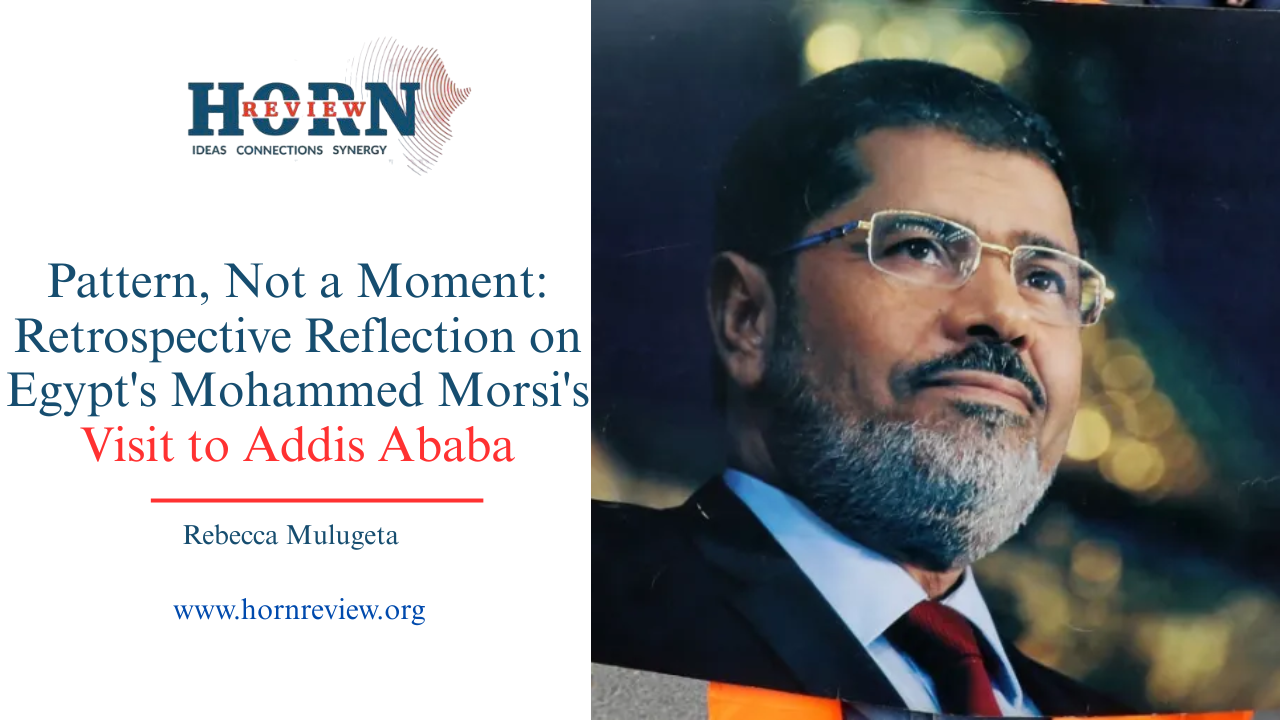
27
Oct
Pattern, Not a Moment: Retrospective Reflection on Egypt’s Mohammed Morsi’s Visit to Addis Ababa
The 2012 Egyptian President Mohamed Morsi trip to Ethiopia, following a 17-year diplomatic hiatus, is not only an instant reaction to his rise to power in 2011 after Mubarak’s removal. It proves to reflect more measured political agendas under the cover of regional politics of the Grand Ethiopian Renaissance Dam (GERD) and Egypt’s eternal Nile water security obsession. Egypt’s foreign policy approach in the Red Sea and Horn of Africa has long included a deliberate cycle of taking advantage of Ethiopian weakness at a point in time to build on Egypt’s interests, especially over the Nile waters. The cycle has been unusually persistent, informing Egypt’s foreign policy during the Morsi era to the present.
Historically, Egypt has been attempting to dominate the Nile basin by capitalizing on the leadership voids in Ethiopia, political chaos, and regional challenges, specifically for control and management of the Nile, a question that now extends to ambitious efforts to exert hegemonic dominance over the Red Sea. Basis of this policy lies in the nineteenth century with the Egyptian-Ethiopian rivalry, when Egypt attempted to assert control over the sources of the Blue Nile. After that, twentieth-century treaties habitually excluded Ethiopia from primary Nile water decisions, firmly establishing Egypt’s dominance using legal machinery that ignored Ethiopia’s interests that only provided it with the privilege of utilizing it but not utilizing it for the electricity.
Cut forward to 2012, a quintessentially representative time of this long-time tactic, and one which took place under extraordinary geopolitical conditions. In 2012, in the aftermath of the Arab spring and the overthrow of Hosni Mubarak Egyptian President Mohamed Morsi traveled on a historic diplomatic tour to Ethiopia, his country’s first head of state to visit in 17 years, and the first since an assassination attempt against Hosni Mubarak in 1995 had collapsed diplomatic relations. This tour was not an accident of timing. It coincided with the same period that Ethiopia’s long-time ruler, Meles Zenawi, was seriously ailing and was absent from crucial summits, such as the African Union summit in Addis Ababa.
With Meles absent, Ethiopia lacked fully consolidated leadership, as Hailemariam Desalegn acted only as a transitional figure. This leadership vacuum created a rare “open space” for Egypt to advance its agenda with relatively little resistance from Ethiopia’s traditionally firm diplomatic posture. Morsi’s trip was thus a masterstroke of opportunistic diplomacy, engineered to exploit Ethiopia’s political fragility. His role in Ethiopia’s transitional government was what allowed him to rally African nations and regional players against Ethiopia’s Grand Ethiopian Renaissance Dam (GERD) project, which Egypt saw as an existential threat to its water security.
Morsi did not shy away from hardline comments on the leaked video, seen threatening to “Bomb the Dam’” if Ethiopia proceeded with its plans, a stark signal reflecting Egypt’s uncompromising stance.This visit served several strategic purposes beyond the immediate diplomatic gesture. Firstly, it marked Morsi’s endeavor to restore Egypt’s regional leadership mantle following the upheaval of the 2011 Egyptian revolution, which culminated in Mubarak’s fall. After nearly two decades of diplomatic complacency brought about by internal insecurity in the region and previous security concerns, the visit by Morsi was a message that Egypt wished to reclaim its position in the Horn of Africa and in African Union affairs.
Second, Ethiopia’s temporary political status offered a singular site of leverage that Egypt could employ to displace Ethiopia in Nile basin talks, leaving Addis Ababa diplomatically isolated when its internal leadership weaknesses were revealed. Moreover, Morsi’s fiery rhetoric projected both internal and external political messages that domestically, it consolidated nationalist support by emphasizing Egypt’s non-negotiable claim to Nile waters in a fragile post-revolutionary context; regionally, it broadcast a warning to all Nile riparian states of Egypt’s resolve to maintain its historical rights by any means necessary. Strategically, the visit re-wrote the diplomatic playbook, reopened debate in regional institutions, and sought to form alliances to put pressure on Ethiopia before the build-out of the GERD became irreversible.
Flash forward to 2025, and Egypt’s ambitions on the region have seeped yet again further outside the Nile waters themselves into master control of the Red Sea, a key sea corridor full of natural riches and strategic shipping lanes. Egypt launched the Egyptian Red Sea Initiative, a multi-million dollar program to protect coral reefs and sea ecosystems. This move establishes Egypt’s sovereign control over major Red Sea coastal regions and re-establishes its regulatory grip over territorial waters, environmental protection, and port management. It is a comprehensive maneuver not just to advance power but to push back Ethiopia’s plans to expand its maritime influence via Djiboutian and Somaliland ports. Egypt’s drive for Red Sea supremacy is part of an upper-level plan to counterbalance regional opponents and constrain Ethiopia’s access to key maritime egress, thus pinning down Ethiopian ambitions within Nile waters as well as beyond. Egypt’s recent actions bear the unmistakable imprimatur of its ancient doctrine of playing on Ethiopian vulnerability.
From the nineteenth century Egyptian-Ethiopian military confrontations, through the exclusionary treaties of the twentieth century, to the diplomatically charged 2012 campaign amid Meles Zenawi’s absence, and now through the multifaceted Red Sea initiatives, a singular Egyptian pattern of diplomatic opportunism emerges. This persistent approach combines tactical exploitation of Ethiopian leadership gaps with simultaneous strategic efforts to shape regional water and maritime governance in Egypt’s favor. For Ethiopia, this historical continuum underscores urgent imperatives.
The 2012 Morsi visit forthrightly revealed the exposedness of leadership in venturing the nation into opening up to external diplomatic assault with potentially existence-oriented consequences. The path forward for Ethiopia entails the incorporation of robust, resilient political leadership that can express and defend national interests at all diplomatic levels. Regional unity, in the African Union and in other Red Sea states, must be strengthened to achieve a solid front that can resist pressure for fragmentation and diplomatic isolationist policies, as well as Ethiopia’s protection of its national interests needing a strategic design that foresees not only diplomatic and rhetorical battles, but also clandestine security and economic measures seeking to undermine its position.
The GERD itself is a broader assertion of Ethiopian development and sovereignty aspiration, but one that must be supported by enduring political stability and international diplomacy to counter Egypt’s multifaceted resistance. Overall, Egypt’s 2012 trip to Ethiopia well below a typical diplomatic visit was a calculated political maneuver utilizing leadership vacancies and state changes to reclaim Nile waters and regional politics. At the same time, Egypt’s 2025 Red Sea projects demonstrate an expanding strategic vision that merges water security and naval hegemony, forming a contiguous zone of influence extending from the Nile Basin to the sea lanes critical to global trade.
It is this opportunism-strategic leverage continuum that needs to be grasped by Ethiopia so as to establish long-term policies shielding its sovereignty. Ethiopia’s national interest is to fortify internal leadership resilience, develop multilateral coalitions, and aggressively thrust itself in regional spheres. This will not only reverse historic vulnerabilities Egypt capitalizes on but enable Ethiopia to chart a cooperative and equitable future for the Horn of Africa a future in which dominance over strategic resources like the Nile and the Red Sea derives from common interests rather than zero-sum rivalry.Thus, Ethiopia’s response to both historical and contemporary Egyptian strategies must be informed, cohesive, and forward-looking, ensuring that its rightful claims are protected against recurring patterns of external opportunism and shifting regional power dynamics. This integrated approach is the cornerstone of securing peace, stability, and sustainable development across the Horn and beyond.
By Rebecca Mulugeta, Researcher, Horn Review

